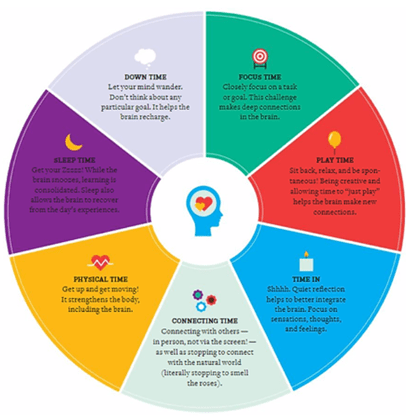
Strategy #2: Maximize Energy: Create a healthy mind platter
In the spirit of optimizing time and energy, last month, we highlighted strategy and tips focused on time management (attention management). To complement this, we continue our blog discussion to focus on ways to optimize energy based on what you can do. It’s a called a Healthy Mind Platter. In essence, here are ways to create a balanced mental diet.
Here are 7 daily activities for mental nutrients for your brain to function at its’ best and energize you!
1. Sleep time – Sleep enhances memory, creative thinking, learning, and emotional regulation. Research indicates that most of us require between 7-9 hours of sleep. If this is not possible in one-sitting, try taking short naps about 20 minutes or “siesta model” of one five-to-seven-hour chunk of sleep and second daytime nap of 1-2 hours. To get into “sleep time mode,” I put away all devices such as phone, tv, IPAD, etc. (out of sight and reach) 45 minutes before sleeping and read in bed or meditate/take deep breathes. This allows me to unwind my mind.
2. Physical time – Physical activity or movement increases blood flow to your brain, helps activate genes responsible for neuroplasticity and increases level of brain-derived neurotrophic factor (BDNF), a molecule that helps promote memory formation and learning. Studies show that exercise helps reduce stress, anxiety, and depression (not to mention aging). If you are new to regular physical time or movement, start with 3 times/week for 20 minutes and slowly increase it to 30-55 minutes. Mix-up the intensity of cardio, strength-training, and endurance. Examples: walking, yoga, swimming, barre, exercise class or weights. Do what moves you!
3. Focus time – This is NOT multi-tasking. It is a time of sustained and uninterrupted attention to a single task. It’s a state of flow for your brain where you are so into what you are doing that you lose track of time. You gain a sense of mastery and completeness. This could refer to your hobbies. I enjoy journaling and reading.
4. Connecting time – Research indicates that social support improves physical health and mortality and helps manage stress, confront challenges, and maintain a positive outlook. M. Lieberman, one of the founders of social cognitive neuroscience, views social connection as a basic human need. Take time to connect with a friend or colleague over coffee/tea/ drink or go for a walk. Twice a month, I meet-up with a friend for 1-1.5 hours. I schedule it into my calendar or be spontaneous!
5. Playtime – This is unstructured play that helps social skills, facilitates learning, and helps people practice new motor skills. It releases dopamine that supports optimal cortical function. Jack Panksepp, a neuroscientist, indicates it is one of the basic emotional systems in human beings. My playtime involves playing a board game, laughing with my friends, and singing in the car.
6. Downtime – Unplug. You do not have a goal or outcomes in-mind. It is being lazy, chilling, daydreaming, and disconnecting. For our brain, when this happens, it helps with memory, sense of self and others, reflection, and integration. We naturally come into this state when we are exhausted. This activity enhances insight. We don’t “schedule” it, but the benefits are there. I go out in my patio with a cup of coffee in the morning or end of the day and just gaze out into my white rose bushes in my garden.
7. Time in – This is about awareness of self and inner life (thoughts, emotions, bodily sensations) and external world- mindfulness. Studies indicate if this is practiced regularly it helps regulate emotions, enhances attention and creativity, reduces stress and increases empathy. It has also shown to improve symptoms of anxiety, depression, and pain management. Twice per week, I sit in front of my temple and take some deep breathes for 10 minutes in the morning.
Take baby steps as you make these activities a part of your daily routine. Start by adding 1-2 daily activities per week and work your way up to include as many as you can.
